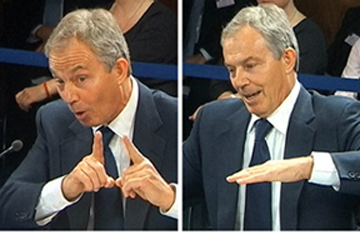
A combination of still images from video shows former British Prime Minister Tony Blair speaking at an inquiry into Britain's role in the Iraq War, at the Queen Elizabeth II Conference Centre, in London January 21, 2011
Britain's inquiry into the Iraq War was established to stop history from repeating itself. Today the inquiry conspicuously failed in that aim, as former Prime Minister Tony Blair, summoned for a second time to give testimony, deployed a palette of arguments unchanged from his January 2010 appearance to emerge, exactly as before, unscathed and unrepentant. The panel, chaired by career civil servant Sir John Chilcot, sought to tease out any lessons from the past that might prevent a future government from echoing mistakes that led to Iraq's ill-planned 2003 invasion and worse-planned aftermath. But the issue Blair kept returning to — largely because he kept raising it, batting aside his interrogators' carefully strategized questions — was this: what to do, in the present day, about Iran. And the man who has served as peace envoy to the Middle East since his departure from Downing Street over three years ago sounded an unapologetically martial note. Iran, Blair declared, is a "looming and coming challenge."
Again, you could hardly call this news. The former premier made similar noises the first time he sat before the inquiry a year ago. His message, however, has gained stridency. "At some point — and I say this to you with all the passion I possibly can — the West has got to get out of this wretched policy, or posture, of apology for believing that we are causing what the Iranians are doing, or what these extremists are doing," said Blair, in the fifth and final hour of Friday's hearing. "The fact is they are doing it because they disagree fundamentally with our way of life and they will carry on doing it unless they are met with the requisite determination and, if necessary, force."
It was a dramatic reaffirmation of the liberal interventionism that underpinned Blair's approach to Iraq, and it took up time that the panel might have otherwise used to quiz him on disparities between his evidence and the masses of oral and written testimony and mountains of documentation the inquiry has collected since its inception in 2009. In the post-WikiLeaks world, it seems startling that a substantial proportion of the classified evidence remains exactly that: classified. A detailed request for information, sent by the inquiry to Blair ahead of his recall, was published as he took the stand. All references to private notes from Blair to former President George Bush had been redacted, to odd effect. "At the end of July 2002 you sent a letter to President Bush which began '[CENSORED]' How did you find the United States Administration had interpreted your comments?" reads a typical passage from the request. Journalists watching Blair's testimony entertained themselves by guessing the words the censors had obscured.
Yet neither secrecy nor a shortage of information poses the biggest obstacle to the inquiry in its quest to uncover the truth and draw clear conclusions. On the contrary, it is drowning in unprocessed information. The panel's own voluminous research has been supplemented by a slew of confessional autobiographies from key players in the build-up to the Iraq invasion and the post-war reconstruction efforts, not least Blair's A Journey and Bush's Decision Points, both published last year. There were so many questions for Blair, several generated by his memoirs, that the inquiry lacked sufficient time during his latest appearance to investigate any one of them thoroughly.
A memo dated March 17, 2002, sent by Blair to his chief of staff Jonathan Powell ahead of a U.S. visit, contains this intriguing lament: "In all my papers, I do not have a proper worked-out strategy on how we would do it." Chilcot and his team made only cursory efforts to pin down Blair on what "it" might be. The context suggests a game-plan for invasion, at a time when Blair maintains no such plan existed. A few paragraphs later Blair makes a revealing observation. "A political philosophy that does care about other nations — eg, Kosovo, Afghanistan, Sierra Leone — and is prepared to change regimes on merits, should be gung ho on Saddam."
Fast-forward to 2011, and Blair is gung ho on Iran. He also remains convinced that the decision to topple Saddam was correct. But at the end of Friday's hearing he sought to clarify this stance as expressed during his first evidence session last year, which he said had been misinterpreted to mean he did not regret the loss of life that military action had entailed. "I regret deeply and profoundly the loss of life," he said on Friday, "whether from our own armed forces, those of other nations, the civilians who helped people in Iraq, or the Iraqis themselves. And I just wanted to say that because it is right to say that and it is what I feel." "Too late!" cried a woman sitting behind him.
Deirdre Gover, 64, had traveled all the way from her home in Paris to attend the hearing, just as she did last year. Her son, Flight Lieutenant Kristian Gover, was killed in a helicopter accident in Basra in 2004. She does not believe Kristian, or any of his colleagues, should have been there. "We were taken to war on false pretences," she says. Until the Iraq inquiry backs that view or at least provides greater clarity, she cannot find closure. For families and Iraq veterans, the inquiry offers the best hope of breaking out of the personal histories of unresolved grief and anger that they appear otherwise doomed to repeat.
